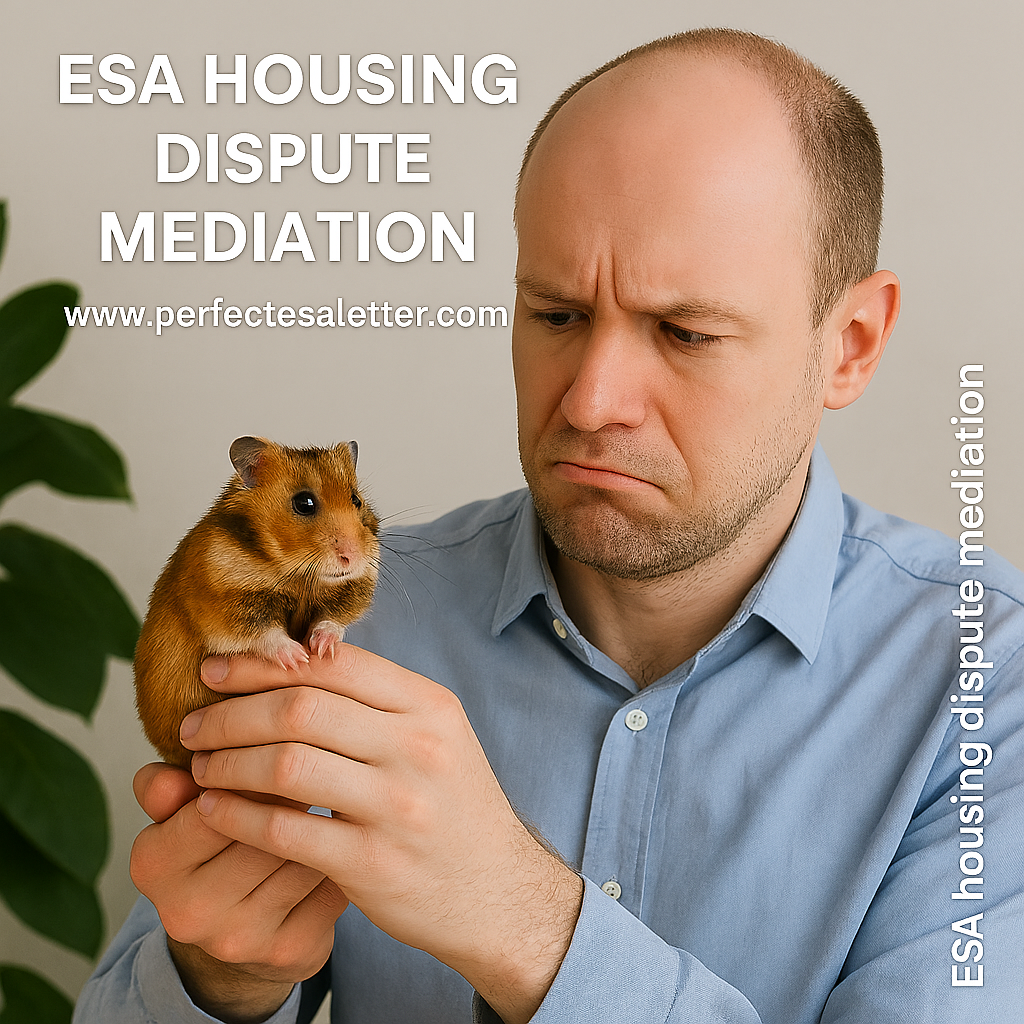ESA Housing Dispute Mediation: Resolving Conflicts Between Tenants and Landlords
ESA Housing Dispute Mediation: Resolving Conflicts Between Tenants and Landlords
Introduction
Conflicts between tenants with emotional support animals (ESAs) and landlords are increasingly common. While federal laws like the Fair Housing Act (FHA) protect ESA owners in the U.S., misunderstandings and disputes often arise. Landlords may be unaware of ESA rights, and tenants may struggle to advocate for themselves effectively.
When tensions escalate, mediation can serve as a practical, less confrontational alternative to court proceedings. This article explains ESA housing dispute mediation, tenant and landlord rights, and how both parties can work toward fair solutions.
”Get Yours Now!
Don’t wait until a landlord or airline tells you “no pets allowed.” Protect your rights today.
Please fill out this form and our team wil contact you ASAP.
Complete your assessment in minutes , get approved by a licensed professional, and receive your letter within 24 hours.
Why ESA Housing Disputes Happen
- No-Pet Policies – Landlords may enforce strict pet bans, unaware that ESAs are legally protected.
- Documentation Issues – Some landlords question ESA letters or demand unnecessary paperwork.
- Allergies or Safety Concerns – Other tenants may have medical concerns about animals.
- Property Damage Fears – Landlords often worry about ESA-related damages.
- Miscommunication – Tenants may not disclose ESAs upfront, leading to trust issues.
What is ESA Housing Dispute Mediation?
Mediation is a voluntary, confidential process where a neutral third party helps tenants and landlords resolve conflicts.
- Unlike court, mediation is informal and collaborative.
- Both sides get the chance to share their perspective.
- The mediator guides the conversation toward mutually acceptable solutions.
- Agreements reached in mediation can be legally binding if formalized.
Legal Framework for ESA Housing Mediation
1. Fair Housing Act (FHA)
- Requires landlords to provide reasonable accommodation for ESAs.
- Prohibits discrimination against tenants with disabilities.
2. HUD Guidelines
- Landlords may ask for documentation but cannot demand detailed medical records.
- ESA letters from licensed professionals are valid proof.
3. State & Local Laws
- Some states add extra protections for ESA tenants.
- Mediation often references both federal and state housing laws.
The Mediation Process for ESA Housing Disputes
- Filing a Complaint
- Tenants usually begin by filing a complaint with the housing authority or requesting mediation directly.
- Selecting a Mediator
- Mediators may be provided by the Department of Housing and Urban Development (HUD), local fair housing agencies, or private services.
- Initial Meetings
- Both parties meet separately with the mediator to explain their concerns.
- Joint Session
- The mediator brings both sides together, encouraging respectful communication.
- Exploring Solutions
- Examples: allowing the ESA with conditions, extra deposit agreements, designated pet areas.
- Written Agreement
- If both sides agree, terms are documented and may become legally enforceable.
Benefits of ESA Housing Mediation
- Less Expensive than going to court.
- Faster Resolution – disputes can be settled in days or weeks instead of months.
- Relationship Preservation – helps maintain a cooperative landlord-tenant relationship.
- Confidential Process – unlike court records, mediation is private.
- Customized Solutions – agreements can be tailored to the specific situation.
Examples of Mediation Outcomes
- Tenant Keeps ESA – Landlord agrees once documentation is verified.
- Conditional Agreement – ESA allowed with added cleaning deposit.
- Alternative Arrangements – Tenant may agree to use common areas responsibly.
- Education-Based Resolution – Landlord learns about FHA requirements and adjusts policies.
Challenges in ESA Mediation
- Uncooperative Landlords – Some landlords refuse to compromise.
- Invalid ESA Letters – Online letters without proper evaluation can cause disputes.
- Health Conflicts – Allergies or phobias among other tenants may complicate solutions.
- Power Imbalances – Tenants may feel intimidated in negotiations.
Tips for Tenants Entering Mediation
- Bring Documentation – A valid ESA letter from a licensed provider.
- Stay Calm and Respectful – Focus on facts, not emotions.
- Know Your Rights – Understand FHA protections and local housing laws.
- Be Open to Compromise – Suggest cleaning fees, pet insurance, or behavior training.
Tips for Landlords in ESA Mediation
- Understand the Law – ESAs are not pets under the FHA.
- Review Documentation Carefully – Verify letters without overstepping privacy laws.
- Raise Concerns Respectfully – Focus on property management issues, not personal bias.
- Seek Middle Ground – Consider solutions that protect both tenant needs and property value.
Alternatives if Mediation Fails
- HUD Complaint – Tenants can file with the U.S. Department of Housing and Urban Development.
- Fair Housing Agency – Local agencies investigate discrimination claims.
- Court Action – Last resort, but possible if mediation fails.
- Relocation Assistance – In rare cases, tenants may seek relocation support.
Resources for ESA Housing Mediation
- HUD Office of Fair Housing & Equal Opportunity – Federal complaint filing.
- Local Fair Housing Councils – Mediation services and education.
- Legal Aid Societies – Free or low-cost legal assistance.
- Mediation Centers – Independent conflict resolution services.
Conclusion
ESA housing disputes can be stressful for both tenants and landlords, but mediation offers a fair, efficient, and respectful path to resolution. By focusing on communication, understanding rights, and exploring practical compromises, both sides can reach agreements that protect tenant needs while addressing landlord concerns.
Instead of escalating to costly legal battles, ESA housing dispute mediation provides a win-win solution, preserving housing stability and promoting mental health support for tenants who depend on emotional support animals.
”Get Yours Now!
Don’t wait until a landlord or airline tells you “no pets allowed.” Protect your rights today.
Please fill out this form and our team wil contact you ASAP.
Complete your assessment in minutes , get approved by a licensed professional, and receive your letter within 24 hours.

